The Auditory Brainstem Response Analyzers Market is estimated to be valued at USD 3.2 billion in 2025 and is projected to reach USD 6.4 billion by 2035, registering a compound annual growth rate (CAGR) of 7.2% over the forecast period.
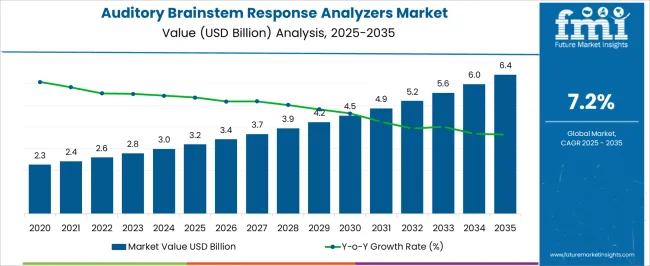
| Metric | Value |
|---|---|
| Auditory Brainstem Response Analyzers Market Estimated Value in (2025 E) | USD 3.2 billion |
| Auditory Brainstem Response Analyzers Market Forecast Value in (2035 F) | USD 6.4 billion |
| Forecast CAGR (2025 to 2035) | 7.2% |
The Auditory Brainstem Response Analyzers market is experiencing steady growth due to increasing awareness of hearing disorders, rising prevalence of neurological and auditory impairments, and growing adoption of advanced diagnostic technologies in clinical settings. The market is being influenced by the shift toward more precise and early detection methods for auditory and neurological conditions.
Hospitals and specialized clinics are increasingly integrating these analyzers into routine diagnostic workflows, which enhances patient outcomes and supports preventive care initiatives. Technological advancements, such as the development of portable devices and user-friendly interfaces, have reduced the complexity of auditory testing and expanded accessibility in both urban and remote regions.
The future outlook of the market is positive, supported by continued investments in healthcare infrastructure, expansion of audiology services, and the growing importance of early intervention for auditory impairments in neonates and adults Additionally, an emphasis on clinical accuracy, compliance with safety standards, and integration with electronic health systems is expected to drive further adoption and market expansion.
The auditory brainstem response analyzers market is segmented by device type, modality, end user, and geographic regions. By device type, auditory brainstem response analyzers market is divided into Systems, Single recording channels, Dual recording channels, and Software. In terms of modality, auditory brainstem response analyzers market is classified into Portable and Handheld. Based on end user, auditory brainstem response analyzers market is segmented into Hospitals, Specialty Clinics, and Others. Regionally, the auditory brainstem response analyzers industry is classified into North America, Latin America, Western Europe, Eastern Europe, Balkan & Baltic Countries, Russia & Belarus, Central Asia, East Asia, South Asia & Pacific, and the Middle East & Africa.
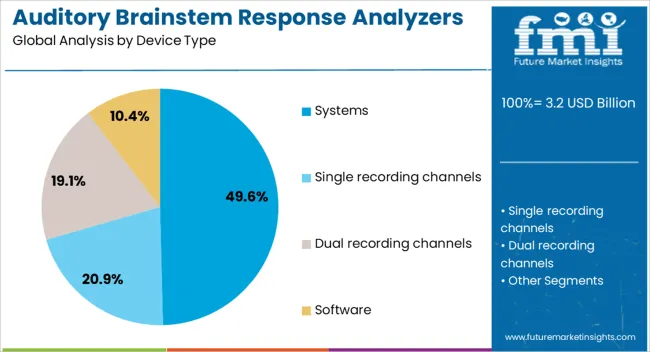
The Systems device type is projected to hold 49.60% of the Auditory Brainstem Response Analyzers market revenue share in 2025, making it the leading device category. This dominance can be attributed to its high reliability, accuracy, and comprehensive functionality, which are critical for detailed auditory and neurological diagnostics.
Adoption has been fueled by the preference of hospitals and specialized diagnostic centers for full-featured systems capable of supporting multiple patient profiles and a range of auditory tests. The ability to integrate with existing clinical infrastructure and provide consistent results across repeated measurements has reinforced the growth of this segment.
Systems offer robust capabilities for waveform analysis, automated threshold detection, and long-term monitoring, which makes them preferable over simpler or portable alternatives in high-volume clinical environments The ongoing demand for precise auditory assessment tools, coupled with increasing awareness of early detection benefits, is expected to sustain the market leadership of systems in the foreseeable future.
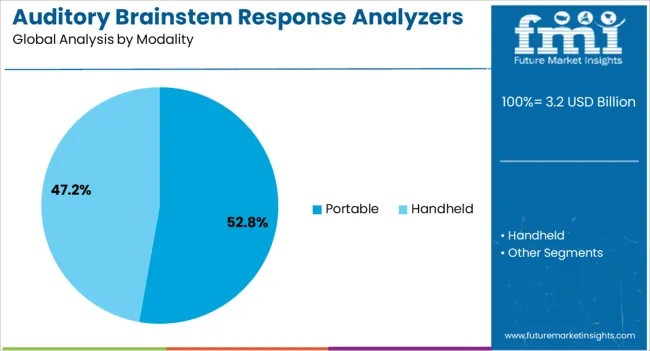
The Portable modality segment is expected to hold 52.80% of the total Auditory Brainstem Response Analyzers market revenue in 2025, emerging as the leading modality. Growth in this segment has been driven by the increasing need for flexible diagnostic solutions that can be deployed across diverse clinical and community settings. Portability allows testing to be conducted at patient bedsides, remote clinics, and neonatal units, thereby improving accessibility and efficiency.
The rise in demand for mobile healthcare services and outreach programs has further supported the adoption of portable analyzers. These devices are designed for ease of use, quick setup, and integration with electronic data recording, which enhances workflow efficiency and reduces operational downtime.
Furthermore, advancements in battery life, compact design, and software-enabled analysis have made portable analyzers highly reliable The continued focus on expanding audiology services and the push for early detection of auditory disorders are expected to reinforce the dominance of the portable segment in the coming years.
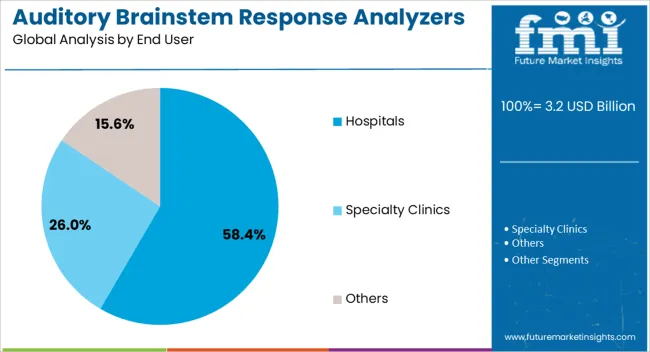
The Hospitals end-user segment is anticipated to hold 58.40% of the Auditory Brainstem Response Analyzers market revenue in 2025, positioning it as the largest consumer of these devices. This growth is driven by the increasing integration of auditory diagnostics into routine hospital practices and the rising prevalence of hearing and neurological disorders requiring systematic assessment. Hospitals benefit from the use of advanced analyzers for neonates, pediatric populations, and adult patients, enabling comprehensive auditory evaluations and early interventions.
The ability of analyzers to support high patient throughput, maintain consistent testing standards, and interface with hospital information systems has further contributed to their widespread adoption. In addition, hospitals are investing in portable and full-featured systems to expand diagnostic reach and improve patient care efficiency.
Government initiatives and healthcare policies emphasizing early screening programs, particularly in maternity and neonatal care, are also enhancing market penetration The continued expansion of hospital infrastructure and the focus on advanced diagnostic solutions are expected to sustain the leadership of this end-user segment.
Auditory brainstem response analyzers are the instruments which are used to check the integrity of the hearing system. The auditory brainstem response analyzers consist of electrodes and an analyzing system attached with it .There are three or four sticker type electrodes which are placed on the head of the child .Sounds are obtained with the help of earphones and the electrodes measure the response produced by the child's nervous system .
The electromagnetic signals produced by auditory brainstem response analyzers in response to the sounds are amplified and the doctor or the hearing specialist looks for certain neurological markers as the child's hearing nerves respond to different sounds. The auditory brainstem response analyzers measures the intensity or the softness or the level of loudness at which these markers appear and these markers gives an idea about the level of child's hearing system in that particular range or at a particular pitch . A printout of the database is obtained, the markers are interpreted and finally the hearing problem is recognized by the doctor.
The process of checking the accuracy of child's hearing system by using these auditory brainstem response analyzers is called Auditory brainstem response test .This test is done to diagnose the hearing deficiencies in early childhood . The electromagnetic signals which are used to diagnose the neurological disorders are called as auditory evoked potentials .
They are basically produced by our nervous system in response to a stimuli. In a general auditory brainstem response test there are two separated electrodes which are used to produce the signals .One electrode is the non inverting electrode and the other electrode which is used as a reference electrode is an inverting electrode. The response voltage by the eletrodes are obtained and amplified to check the integrity of the hearing system. The auditory brainstem response test is a very safe test and it does not hurt.
Rising prevelance of hearing impairement such as hearing loss, genetic hearing disorders, and eardrum related disorders in infants is one of the important reason for the growth in auditory brainstem response analyzers market.
The fact that auditory response test is a very safe and painless test is expected to increase the growth of auditory brainstem response analyzers market. The advanced, wireless and noiseless technological advancements of the auditory brainstem response analyzers is a factor responsible for growth in revenue generation in auditory brainstem response analyzers market. Auditory brainstem response test do not have any side effects on the patient. Auditory Brainstem Response Analyzers provide clear, accurate and timely assessments.
Owing to these factors a growth in revenue generation for the auditory brainstem response analyzers market has been registered. High cost of auditory brainstem response analyzers is expected to restrain the growth of auditory brainstem response analyzers market. However, some of the common risks associated with sedation, lengthy test times and lack of awareness among people are expected to restrain the revenue growth in auditory brainstem response analyzers market.
Based on device type, software based auditory brainstem response analyzers registers the highest revenue share in the auditory brainstem response analyzers .Portable auditory brainstem response analyzers are the most common type of analyzers used because of the flexibility and easiness to carry it .
Based on the end users, auditory brainstem response analyzers are used in hospitals or specialty clinics. With the increase in the technological advancements, many new type of auditory brainstem response analyzers are launched which are expected to increase the revenue of auditory brainstem response analyzers.
On the basis of geography, global auditory brainstem response analyzers market is segmented into seven key regions viz. North America, Latin America, Western Europe, Eastern Europe, and Asia Pacific excluding Japan, Japan, and Middle East & Africa. North America is projected to hold largest shares in the global auditory brainstem response analyzers market primarily due to presence of large number of hospitals and advanced healthcare infrastructure.
However, Asia-Pacific is expected to register the fastest growth in revenue generation for auditory brainstem response analyzers market on the account of presence of giant local manufacturers in countries such as Japan, China and India. Whereas, Latin America owing to presence of less stringent regulatory framework and upgraded research infrastructure is expected to experience high demand for auditory brainstem response analyzers in the region.
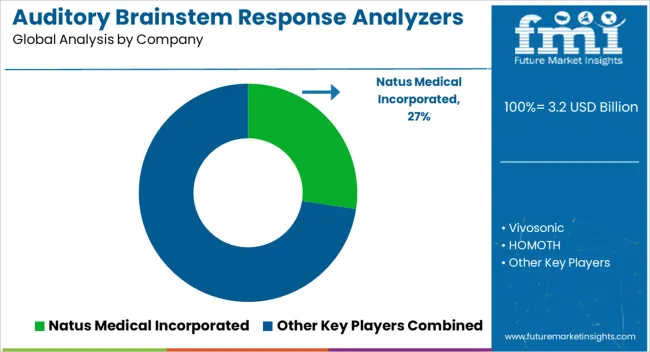
Some of the key players present in global auditory brainstem response analyzers market are vivasonic, Natus, Homoth medizin elecktronic, Labat, Phonac, Starkey Laboratories and others.
The report is a compilation of first-hand information, qualitative and quantitative assessment by industry analysts, inputs from industry experts and industry participants across the value chain. The report provides in-depth analysis of parent market trends, macroeconomic indicators and governing factors along with market attractiveness as per segments. The report also maps the qualitative impact of various market factors on market segments and geographies.
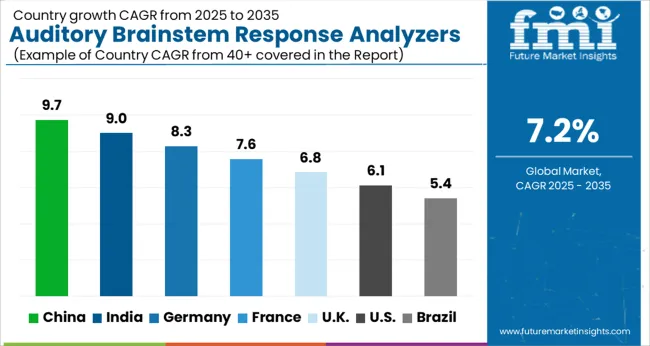
| Country | CAGR |
|---|---|
| China | 9.7% |
| India | 9.0% |
| Germany | 8.3% |
| France | 7.6% |
| UK | 6.8% |
| USA | 6.1% |
| Brazil | 5.4% |
The Auditory Brainstem Response Analyzers Market is expected to register a CAGR of 7.2% during the forecast period, exhibiting varied country level momentum. China leads with the highest CAGR of 9.7%, followed by India at 9.0%. Developed markets such as Germany, France, and the UK continue to expand steadily, while the USA is likely to grow at consistent rates. Brazil posts the lowest CAGR at 5.4%, yet still underscores a broadly positive trajectory for the global Auditory Brainstem Response Analyzers Market. In 2024, Germany held a dominant revenue in the Western Europe market and is expected to grow with a CAGR of 8.3%. The USA Auditory Brainstem Response Analyzers Market is estimated to be valued at USD 1.1 billion in 2025 and is anticipated to reach a valuation of USD 2.0 billion by 2035. Sales are projected to rise at a CAGR of 6.1% over the forecast period between 2025 and 2035. While Japan and South Korea markets are estimated to be valued at USD 156.4 million and USD 89.9 million respectively in 2025.
| Item | Value |
|---|---|
| Quantitative Units | USD 3.2 Billion |
| Device Type | Systems, Single recording channels, Dual recording channels, and Software |
| Modality | Portable and Handheld |
| End User | Hospitals, Specialty Clinics, and Others |
| Regions Covered | North America, Europe, Asia-Pacific, Latin America, Middle East & Africa |
| Country Covered | United States, Canada, Germany, France, United Kingdom, China, Japan, India, Brazil, South Africa |
| Key Companies Profiled | Natus Medical Incorporated, Vivosonic, HOMOTH, Labat, Phonak, Starkey Laboratories, GN Otometrics, and Maico Diagnostics |
The global auditory brainstem response analyzers market is estimated to be valued at USD 3.2 billion in 2025.
The market size for the auditory brainstem response analyzers market is projected to reach USD 6.4 billion by 2035.
The auditory brainstem response analyzers market is expected to grow at a 7.2% CAGR between 2025 and 2035.
The key product types in auditory brainstem response analyzers market are systems, single recording channels, dual recording channels and software.
In terms of modality, portable segment to command 52.8% share in the auditory brainstem response analyzers market in 2025.






Our Research Products

The "Full Research Suite" delivers actionable market intel, deep dives on markets or technologies, so clients act faster, cut risk, and unlock growth.

The Leaderboard benchmarks and ranks top vendors, classifying them as Established Leaders, Leading Challengers, or Disruptors & Challengers.

Locates where complements amplify value and substitutes erode it, forecasting net impact by horizon

We deliver granular, decision-grade intel: market sizing, 5-year forecasts, pricing, adoption, usage, revenue, and operational KPIs—plus competitor tracking, regulation, and value chains—across 60 countries broadly.

Spot the shifts before they hit your P&L. We track inflection points, adoption curves, pricing moves, and ecosystem plays to show where demand is heading, why it is changing, and what to do next across high-growth markets and disruptive tech

Real-time reads of user behavior. We track shifting priorities, perceptions of today’s and next-gen services, and provider experience, then pace how fast tech moves from trial to adoption, blending buyer, consumer, and channel inputs with social signals (#WhySwitch, #UX).

Partner with our analyst team to build a custom report designed around your business priorities. From analysing market trends to assessing competitors or crafting bespoke datasets, we tailor insights to your needs.
Supplier Intelligence
Discovery & Profiling
Capacity & Footprint
Performance & Risk
Compliance & Governance
Commercial Readiness
Who Supplies Whom
Scorecards & Shortlists
Playbooks & Docs
Category Intelligence
Definition & Scope
Demand & Use Cases
Cost Drivers
Market Structure
Supply Chain Map
Trade & Policy
Operating Norms
Deliverables
Buyer Intelligence
Account Basics
Spend & Scope
Procurement Model
Vendor Requirements
Terms & Policies
Entry Strategy
Pain Points & Triggers
Outputs
Pricing Analysis
Benchmarks
Trends
Should-Cost
Indexation
Landed Cost
Commercial Terms
Deliverables
Brand Analysis
Positioning & Value Prop
Share & Presence
Customer Evidence
Go-to-Market
Digital & Reputation
Compliance & Trust
KPIs & Gaps
Outputs
Full Research Suite comprises of:
Market outlook & trends analysis
Interviews & case studies
Strategic recommendations
Vendor profiles & capabilities analysis
5-year forecasts
8 regions and 60+ country-level data splits
Market segment data splits
12 months of continuous data updates
DELIVERED AS:
PDF EXCEL ONLINE
Metal Analyzers Market Size and Share Forecast Outlook 2025 to 2035
Power Analyzers Market
Urine Analyzers Market
Silica Analyzers Market
Genetic Analyzers Market Size and Share Forecast Outlook 2025 to 2035
Albumin Analyzers Market Size and Share Forecast Outlook 2025 to 2035
NMR Fat Analyzers Market Size and Share Forecast Outlook 2025 to 2035
Network Analyzers Market Size and Share Forecast Outlook 2025 to 2035
Mercury Analyzers Market
Process Analyzers Market
Discrete Analyzers Market Growth – Size, Share & Industry Forecast 2025 to 2035
Blood Gas Analyzers Market Size and Share Forecast Outlook 2025 to 2035
Hemostasis Analyzers Market Size and Share Forecast Outlook 2025 to 2035
Natural Gas Analyzers Market Size and Share Forecast Outlook 2025 to 2035
Medical Gas Analyzers Market Size and Share Forecast Outlook 2025 to 2035
Ultraviolet Analyzers Market Growth - Trends & Forecast 2025 to 2035
Handheld XRF Analyzers Market Size and Share Forecast Outlook 2025 to 2035
Total Carbon Analyzers Market Growth - Trends & Outlook 2025 to 2035
Spectral Cell Analyzers Market Size and Share Forecast Outlook 2025 to 2035
Defibrillator Analyzers Market Size and Share Forecast Outlook 2025 to 2035

Thank you!
You will receive an email from our Business Development Manager. Please be sure to check your SPAM/JUNK folder too.
Chat With
MaRIA